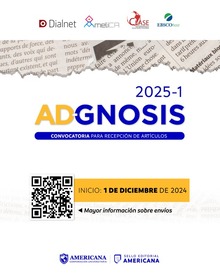Analysis of access to higher education for people with disabilities in institutions of Higher Education and Education for Work and Human Development in the Department of Atlántico
DOI:
https://doi.org/10.21803/adgnosis.v7i7.299Keywords:
People with disabilities, higher education, Education for work and Human Development, reasonable adjustments, incentivesAbstract
This article analyzes through a pilot study, the characteristics of access to higher education for Persons with Disabilities (PWD) in the Departamento del Atla?ntico. The analysis was made based on information collected through surveys of higher education institutions (HEIs), and institutions of Education for Work and Human Development (ETDH) recognized by Ministerio de Educacio?n Nacional with whom inquired about the institutional policies for inclusion, incentives, and strategies designed to promote higher education of this population group. The results indicate the leadership of two HEIs in terms of inclusion, but outside these, the need for clear strategies, processes adapted to the needs of this population, and incentives or economic support focused on the access and permanence of this population both in the IES as in the institutions of ETDH.
Downloads
References
Asamblea del Atla?ntico. (2015). Por medio de la cual se adopta la poli?tica pu?blica de discapacidad e inclusio?n social del departamento del Atla?ntico. [Decreto 1194 de 2015].
Cobos Ricardo, A. & Moreno Angarita, M. (2014). Educacio?n superior y discapacidad: ana?lisis desde la experiencia de algunas universidades colombianas. Revista Espan?ola de Discapacidad (REDIS), 2(2), 83–101.
Congreso de Colombia. (7 de febrero de 1997). Por la cual se establecen mecanismos de integracio?n social de las personas con limitacio?n y se dictan otras disposiciones. [Ley 361 de 1997]. DO: 42.978
CONPES 166 (2013). Discapacidad e inclusio?n social.
Daza Timana?, G. E. & Mosquera Ruiz, M. G. (2013). Determinantes Sociales De La Salud (Dss) Y Discapacidad En Barranquilla, 2012: Resultados Desde El Registro Para La Localizacio?n Y Caracterizacio?n De Personas Con Discapacidad, 1–144.
Garci?a, R. (2003). El futuro de las personas con discapacidad en el mundo. Desarrollo humano y discapacidad. Madrid, Espan?a: Fundacio?n ONCE.
Ministerio de Salud y proteccio?n social. Observatorio Nacional de Discapacidad. Recuperado del sitio de internet http://ondiscapacidad.minsalud.gov.co/Paginas/Inicio.aspx
Ministerio de educacio?n Nacional. Sistema de informacio?n de la educacio?n para el trabajo y el desarrollo humano. Recuperado del sitio de internet https://siet.mineducacion.gov.co/consultasiet/institucion/index.jsp
Ministerio de educacio?n Nacional. (201 Sistema nacional de informacio?n de educacio?n superior. Recuperado de: https://snies.mineducacion.gov.co/consultasnies/institucion
Molina Be?jar, R. (2010). Educacio?n Superior para estudiantes con Discapacidad. Revista de Investigacio?n, 34(70), 1–19.
OECD. (2003). Disability in Higher Education. https://doi.org/10.1787/9789264105072-en
ORMET (2016). Boleti?n de caracterizacio?n de la PcD en el departamento del Atla?ntico.
Ortego Hernando, J. L. (2000). Estudiantes con discapacidad y adaptaciones en los estudios superiores. Educacio?n y Cultura, 13, 207–218.
Pe?rez-Castro, J. (2016). Redalyc.La inclusio?n de las personas con discapacidad en la educacio?n superior en Me?xico. Sine?ctica, Revista Electro?nica de Educacio?n, (46).
Serrano, M., Fajarado, L. & Contreras, J. (2017). Inclusio?n y permanencia de la PcD en las IES en Barranquilla. CEDOTIC. 2(1) 1-29.
Downloads
Published
Issue
Section
License
Copyright (c) 2018 ADGNOSIS

This work is licensed under a Creative Commons Attribution-NonCommercial-NoDerivatives 4.0 International License.






